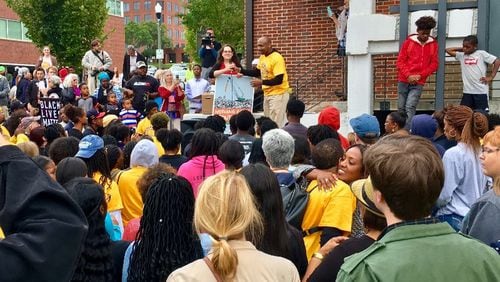An estimated 300 or more people marched through Decatur’s downtown this weekend carrying all manner of homemade posters and banners denouncing fascism, Trumpism, slavery, the Confederacy and those monuments honoring it.
Later as darkness fell Sunday, and the speechifying wound down on the city’s square, a stark, white-lettered message flashed on the old DeKalb County Courthouse reading, “Dismantle White Supremacy.”
The predominant object of scorn: A Confederate obelisk that’s resided either in front or behind the courthouse for 109 years.
A group called “Hate Free Decatur,” a collective calling for the immediate removal of that landmark, organized the march.
The group also is behind a petition effort that has more than 2,400 signatures.
Several days before the event, one of the group’s founders, Sara Patenaude, expressed frustration with what she perceived as willful inaction from government officials.
Politicians, she said, “are hoping if they delay long enough, the interest will go away.”
There was no sign waning interest Sunday. Hate Free Decatur seemed to morph into something transcending the monument.
The 2 ½-hour event featured at least 20 speakers representing organizations such as the NAACP, the Georgia Latino Alliance for Human Rights, the Council on Islamic-American Relations, the Atlanta chapter of the Coalition of Black Trade Unionists, the Jewish Voice of Peace, Black Lives Matter and Black Alliance for Just Immigration.
“What you’re seeing,” Patenaude said as she marched, “is that monument as a catalyst, a symbol for every group that’s been affected by white supremacy.”
Sunday’s crowd was diverse, both racially and age-wise. Not only did adults participate, but children on bicycles and teenagers chanting, “This is what community looks like” and “This is what Decatur looks like.” There were plenty of elderly residents too, including some who, as the speeches forged on, sat down on the base of the monument.
The route, culminating in the square, began at the Beacon Hill Municipal Center, located in what was the heart of the city’s African-American business district from the early 20th century into the 1960s. Former Mayor Elizabeth Wilson has said this was more or less the track taken by the Klan in the 1950s and ’60s when it periodically met on the square after parading through black neighborhoods.
Though no one spoke Sunday favoring the monument, plenty within the city have written or remarked about its complex history. Meantime, local resident Barry Colbaugh has circulated a petition, now reportedly with more than 2,000 signatures, asking that the monument be protected and not moved.
“That Confederate memorial symbolizes the courage of thousands of Southerners who fought bravely during that conflict,” longtime Decatur High teacher Chris Billingsley told city commissioners two weeks ago. “That doesn’t mean you don’t make changes down the road. But I think that, in this political climate we are in right now, this is no time to change something that’s more than 100 years old.”
It appeared no elected officials were present Sunday, though a pro-march message sent from Rep. Renitta Shannon, D-Decatur, was read aloud.
When reached by phone Sunday night, Decatur Mayor Patti Garrett reiterated that the monument’s fate wouldn’t be determined anytime soon. Part of this is due to a complicated state law passed in 2001 that apparently prevents the city or county — the monument’s actually on DeKalb property — from removing the obelisk.
Last Thursday, Garrett and fellow Decatur Commissioner Tony Powers met with two DeKalb commissioners and a representative from CEO Michael Thurmond’s office. They had a discussion about the monument and the media coverage surrounding it, she said. But she added there is no timetable or specific plan is in the works.
“In terms of removing it,” she said, “I’m not aware of any way it can be removed under the current state statute. And as I understand it, the soonest the statute can be changed would be during next year’s legislature.”
About the Author






